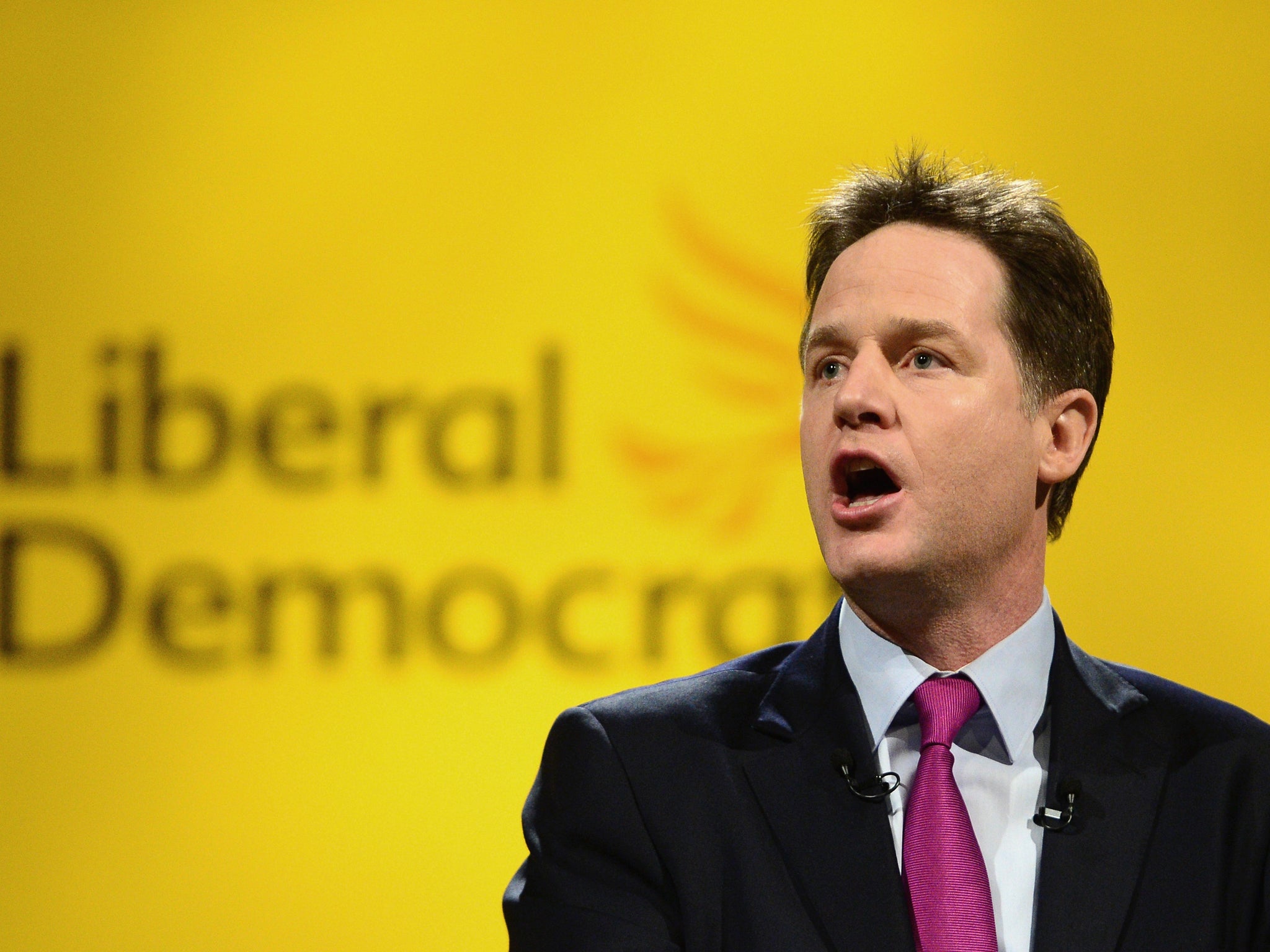It's about time the Lib Dems started asking themselves what they are for
This is the key question for Clegg’s dwindling band of Lib Dems – and it is one they struggle to answer these days


Almost four years ago a senior Liberal Democrat outlined his vision of the party’s future to me and pointed to the model of the Free Democrats in Germany, which spent decades playing the role of kingmaker in a range of coalition governments. Despite its small stature, this party was so successful that it spent longer in the country’s government than any other post-war party and played a critical role shaping the nation at the heart of Europe.
The Coalition government had just been formed in Britain while the Free Democrats were on a high, having achieved their finest result with the support of more than one in seven German voters. But the party that once spoke loudly for liberalism seemed to lose its way in alliance with Angela Merkel, becoming more associated with broken promises than defence of personal freedoms. Last year it was rejected by the electorate, failing for the first time to clear the five per cent hurdle needed to enter parliament.
Could the same catastrophe happen here to the Liberal Democrats? This might seem alarmist, yet the latest polling puts their plight into the harshest possible light with just seven per cent of voters saying they support the party. This puts it at real risk of total wipeout at next month’s European elections, when it is defending 12 seats, and of seeing its 57 seats in Westminster reduced to a single-figure rump at next year’s general election.
To appreciate the scale of the slump, this level of support was last seen at a general election in 1970 when the then Liberals did not contest all seats. It is so grim that even a majority of LibDem voters hold an unfavourable view of their leader Nick Clegg. Insiders insist they will do better at the ballot box given their street-fighting abilities and strength of incumbency – but several of their best-known figures are standing down, while the party has fewer members than the number of fans who watched Liverpool win at Anfield yesterday.
Yet there is something inevitable about these disastrous figures – which were collected, it should be noted, before uncomfortable allegations emerged at the weekend over the seedy activities of the late Liberal stalwart Cyril Smith. For the party spent 70 years seeking a return to power – and then having clawed its way back into a Coalition government, has looked increasingly lost and irrelevant with each passing month.
This was the party that became a repository for protest votes, and then having campaigned to restore trust in politics, promptly broke its promise on tuition fees. Yet despite being Deputy Prime Minister, Clegg posed as an anti-establishment figure at his last party conference, claiming it was possible to be in government without behaving like an establishment party. This was a daft stance – and the absurdity is underlined by the alarming rise of Ukip, which plays the anti-politics card with such aplomb and has nearly three times as much support now as the Lib Dems.
Clegg’s troops deserves credit for impressive discipline as support has ebbed away. Almost one in four voters backed them at the last general election. The Lib Dems instantly lost a large chunk of support from the left after joining the Tories in government, then a second big chunk after the tuition fee fiasco at the end of 2010. Since then, their figures pretty much flatlined at about 10 per cent in the polls – until sliding again now in the wake of Clegg’s televised attempt to tackle Ukip leader Nigel Farage over Europe.
This tumble in the polls comes at a bad time. The Scottish referendum campaign is not going well for those in favour of the union; independence still seems unlikely, but it would lead to the loss of one-fifth of current Lib Dem seats if it were to happen. More fundamentally, one of the party’s leading lights has underlined in boldest possible style the crucial question hanging over the party: what is the point of the LibDems these days?
The challenge comes in a book by Jeremy Browne, the former foreign office minister, who advocates a bold prescription of social and economic liberalism to make the country more competitive. He proposes tax cuts, school vouchers, patient choice, the abolition of the House of Lords and a more open immigration system. It is the sort of Orange Book liberalism once espoused by Clegg, but since dulled by his determination to differentiate the party from his coalition partners.
This marks the first salvo in the fight for the shrunken party’s salvation. Arguably, the divisions between social democrats and market liberals are deeper and more profound than the fissures in rival mainstream parties. Much of Browne’s book would be rejected by the likes of Vince Cable and party president Tim Farron, both possibly more in tune with party members and remaining core voters. But as Browne asked so tellingly at the weekend: “Every political party and every politician has to be able to answer the question: if you didn’t exist, why would it be necessary to invent you?”
This is the key question for Clegg’s dwindling band of Lib Dems – and it is one they struggle to answer these days. The party’s survival strategy is to present itself to the electorate as a political force that takes the rough edges off rivals. So they are nicer than the Tories and less spendthrift than Labour. But who can blame voters for turning their back on such a dismal offering – just as they did with their soul mates in Germany?

Join our commenting forum
Join thought-provoking conversations, follow other Independent readers and see their replies